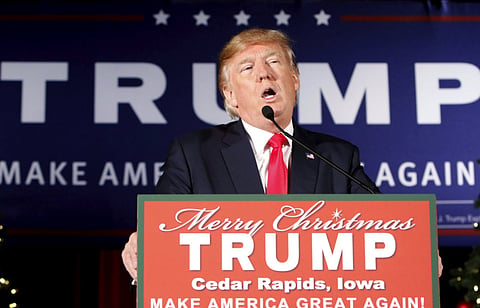Why political apathy rules
Even the current carnivalesque presidential campaign bores most Americans

Here’s a handy rule of thumb for predicting political events in 2016: Most people don’t care about politics. This simple fact helps clarify issues from Brexit through climate change to Donald Trump’s electoral future.
The most basic political act is getting to your local polling station once every few years to vote in your country’s biggest election. In 2012, just 57 per cent of Americans could be bothered. That’s only somewhat below the western norm. Turnout in the most enthusiastic western countries is about 80 per cent.
Outside national elections, most people ignore politics altogether. In 2010 the pollsters YouGov asked voters in the United States, “Suppose that you alone could determine whether a Democrat or a Republican represents your Congressional district by paying a specific dollar amount. How much would you be willing to pay to ensure that a Congressman from your preferred party will win the office?” The response shocked YouGov: “55 per cent of respondents said Zero.” Swinging an election wasn’t worth $1 to them.
Even the current carnivalesque presidential campaign bores most Americans. A Google Consumer Survey found that 57.4 per cent of respondents couldn’t remember any news story about the campaign. The best-known story, Ben Carson’s possibly imaginary scholarship to West Point, registered with only 22.4 per cent.
The comforting retort would be that “real people” disdain the political horse race and only care about serious issues. In fact, the truth is probably the reverse: the only bits of politics that most people enjoy are personal stories about politicians. If voters are always expressing disgust with politicians, perhaps that’s because they find them boring. As long as people have food and a roof and a doctor, most just want politicians to shut up and not come up with dangerous ideas.
“People don’t care about politics” is an insight that keeps on giving. Are Syrian refugees a fifth column bent on spreading extremist terror? No, because most don’t care about politics. Will countries make sacrifices to implement the pledges they made in Paris on cutting carbon emissions? No, because they know their citizens won’t care about climate change until it jumps up and bites them personally on the nose, by which time it will be too late.
Political apathy also demystifies Trump’s high polling numbers. As the statistical analyst Nate Silver points out, most Americans aren’t thinking about the election. If you ask them who they would vote for — a question they hadn’t considered — many will name the one candidate they have heard of.
Britons will soon be voting in a referendum on leaving the European Union. But as polls have long made clear, most Britons find the issue tedious. For instance, when Ipsos Mori asked respondents last year to list the biggest issues facing the United Kingdom, Europe didn’t make the top 10. Business leaders and mainstream politicians should therefore easily manage to scare voters into sticking with Brussels instead of leaping into the unknown for a cause that bores them. As my colleague Janan Ganesh writes, the most widespread political ideology is “loss aversion”.
Every now and then, a messianic candidate emerges on to whom people can project their own fantasies. But when he doesn’t instantly transform the world, the return to slumber is swift. The crowds chanting “Yes we can” for Barack Obama in 2008 didn’t show up for the next midterm elections. The 400,000 new recruits of the UK’s Labour Party who overwhelmingly elected the far-left Jeremy Corbyn as leader will soon go back to finding meaning and companionship outside politics — for instance, in volunteering, New Age spirituality or supporting a sports team.
Successful politicians accept political apathy. In 2005, I asked the rising young Conservative David Cameron whether his plans to shrink the state would interest voters. He replied: “I don’t think anyone gets out of bed in the morning, and thinks, ‘I wish the state was smaller tomorrow than it is today’. Of course not.”
Like most other winning politicians of the past 25 years — Bill Clinton, Tony Blair, Angela Merkel — Cameron rarely sounds ideological. The electorate generally just wants a leader who appears sane, which is why Republicans almost certainly won’t nominate Trump.
Communists used to go around trying to “raise consciousness” among “the people”. Nowadays people in the political industry — who are all selling some version of politics — rage against apathy. In fact, as Ganesh says, apathy is usually a sign that a country is well-governed. Only when things fall apart (as, for instance, in Greece) do ordinary people start following political news. It took the worst financial crisis in 80 years to get voters fleetingly interested in banks.
Political apathy isn’t the same as stupidity. Here is Franz Kafka’s famous diary entry for August 2 1914: “Germany has declared war on Russia. Swimming in the afternoon.” He had bigger things to think about.
— Financial Times


